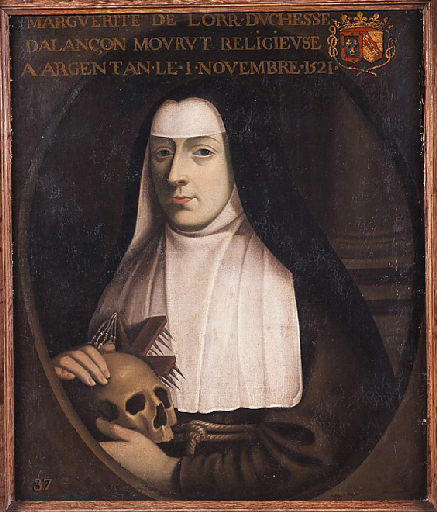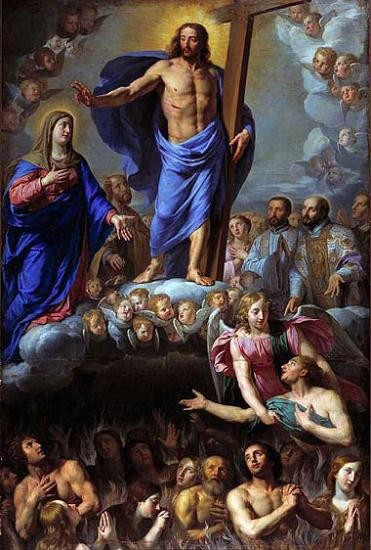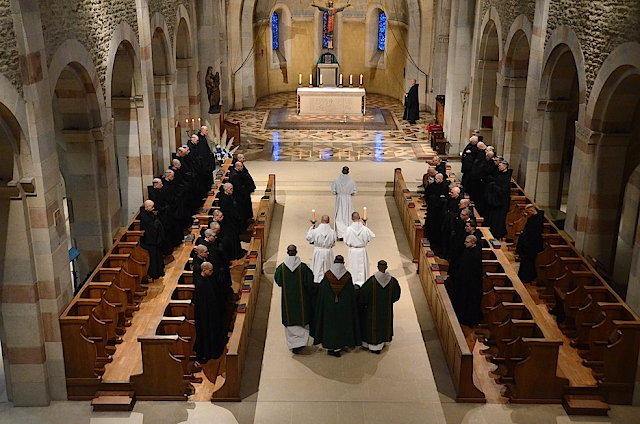Catholic devotions for the 6th November
Scroll down for today's
Saint of the Day/ Feast
Reading of the Martyrology
Dedication of the Month
Dedication of the Day
Rosary
Five Wounds Rosary in Latin
Seven Sorrows Rosary in English
Latin Monastic Office
Reading of the Rule of Saint Benedict
Celebration of Mass
Reading from the School of Jesus Crucified
Feast of Blessed Margaret of Lorraine
Duchess d'Alencon, religious of the order of Poor Clares, born in 1463 at the castle of Vaudémont (Lorraine); died at Argentan (Brittany) 2 November, 1521. The daughter of Ferri de Vaudimont and of Yolande d'Anjou, little Margaret became an orphan at an early age and was brought up at Aix-en-Provençe, by King of René of Anjou, her grandfather. The latter dying in 1480 she was sent back to Lorraine to her brother, René II, who gave her in marriage at Paris, in 1488, to the Duke d'Alençon. Left a widow in 1492 she busied herself in the administration of her duchy and the education of her children. When she was relieved of the duties imposed upon her by her position she decided to renounce the world and retired to Mortagne, to a monastery of religious women who followed the rule of Saint Elizabeth. Later having brought with her to Argentan some of these nuns she founded there another monastery which she placed, with the authorization of the pope, under the rule of Saint Clare, modified by the Minor Observants. She herself took the religious habit in this house and made her vows on 11 October, 1520, but on 2 November, 1521, after having lived for a year in the most humble and austere manner, she died a most holy death in her modest cell at the age of sixty-two. Her body, preserved in the monastery of the Poor Clares, was transferred when that monastery was suppressed to the church of St. Germain d'Argentan, but in 1793 it was profaned and thrown into the common burying place.
The memory of Margaret of Lorraine is preserved in the "Martyrologium Franciscanum" and in the "Martyrologium gallicanum". After an invitation made by the bishop of Séez, Jacques Camus de Pontcarri, Louis XIII begged Pope Urban VIII to order a canonical inquiry into the virtues and the miracles of the pious Duchess d'Alençon; unfortunately in the political agitation of the time the realization of this plan was lost sight of. At the initiative of the present Bishop of Séez an effort is being made to obtain recognition at the Court of Rome of her cultus. The process is well on its way (successful in 1921)
The Reading from the Martyrology
This Day, the Sixth Day of November
In the Kingdom of Tonkin (Indo-China), the Blessed martyrs Jerome Hermosilla and Valentine Berrio-Ochoa, both bishops; Peter Almato, Francis Gil de Federich, Matthew Alphonse Leziniana, Hyacinth Castafieda, Vincent Liem, priests and missionaries of the Order of Preachers; also Joseph Khang, a catechist of the Third Order of our Father St. Dominic. Although these martyrs died at different times, they were all united by the same strength of Soul, and confirmed the faith they preached by the shedding of their blood. A duplex feast.
At Barcelona in Spain, St. Severus, bishop and martyr. For confessing the Catholic faith, a spike was driven into his skull and he thus won his crown of martyrdom.
At Tunis in Africa, the birthday of St. Felix, martyr. He confessed the faith of Christ and was removed for torture, but the next day he was found dead in his prison. So declared St. Augustine, when explaining a certain psalm to his flock on the feast day of St. Felix.
At Theopolis, now called Antioch,53 ten holy martyrs, who are said to have suffered at the hands of the Saracens.
In Phrygia, St. Atticus, martyr.
At Berg in Flanders, the death of St. Winoc, abbot. He was famed for his virtues and miracles, and he ministered for a long time to the brethren
subject to him.
At Fondi in Latium, St. Felix, monk.
At Limoges in Aquitaine, St. Leonard, confessor. He was a disciple of Bishop St. Remigius. Though of noble birth, he chose a solitary life, and was enriched with holiness and miracles. His goodness manifested itself especially in liberating captives.
Omnes sancti Mártyres, oráte pro nobis.
("All ye Holy Martyrs, pray for us", from the Litaniae Sanctorum, the Litany of the Saints)
November is the Month of the Poor Souls in Purgatory
NOVENA
For the Relief of the Poor Souls in Purgatory
FIFTH DAY Duration of purgatory
PREPARATORY PRAYER: Act of Faith: My God, I believe in Thee, because Thou art Truth itself; I firmly believe the truths revealed to the Church.
Act of Hope: My God, I hope in Thee, because Thou art infinitely good.
Act of Charity: My God, I love Thee with all my heart, and above all things, because Thou are infinitely perfect; and I love my neighbor as myself, for the love of Thee.
(Indulgence 7 years, 7 quarantines, each time. Benedict XIV., Jan. 28, 1756. Plenary once a month, if said every day. Benedict XIII., Jan. 16, 1728.)
MEDITATION: How long do the pains last in Purgatory? Nobody knows. God has allowed some Souls to appear to their friends and benefactors to announce their departure for Heaven, but it seldom happened, and we cannot draw any conclusion from such cases. The period of confinement in Purgatory is probably much longer than we are inclined to think. Oh! how much combustible matter — how many imperfections, venial sins and temporal punishments due to mortal and venial sins — do you think they took with them to be cancelled in the flames of Purgatory? Centuries may pass until Divine Justice is satisfied and the Poor Soul is so purified as to be admitted to the Vision of God. The Venerable Bede relates that it was revealed to Drithelm, a great servant of God, that the Souls of those who spend their whole lives in the state of mortal sin, and are converted only on their death bed, are doomed to suffer the pains of Purgatory to the day of Last Judgment. Father Faber, commenting on this subject, says very justly: “We are not to leave off too soon praying for our parents, friends or relatives, imagining with a foolish and unenlightened esteem for the holiness of their lives, that they are freed from Purgatory much sooner than they really are!”
Let us consider the purity which is necessary to a soul, before being admitted into the presence of God! Let us remember the multitude of our venial sins, and see what light penance we have done for them. On the Day of Judgment the book of our deeds will be opened, and then we will be obliged to pay the last farthing. How guilty we are in abandoning so easily the Souls who need our assistance so much! The Saints are wiser. St. Monica, the mother of St. Augustine, was dead for twenty years, and she was still remembered by her son in the Holy Sacrifice. St. Ambrose promised solemnly and publicly to pray, during his entire life, for the soul of Theodosius the Great.
And supposing that we had delivered the Souls of our relatives and friends, have we emptied the prison of Purgatory? How many poor, abandoned Souls linger in such horrible pains, imploring the as sistance of some charitable heart. Cardinal Belllarmin has affirmed that: “Some Souls would suffer in Purgatory till the Day of Judgment, if they were not relieved by the prayer of the Church.” Therefore, he authorizes the foundation of Masses to be said in perpetuity.
PRACTICE: Would it not be a holy thought to form, among relatives and friends, an association of seven members, so that each would employ a day of the week for the relief of the “Poor Souls.”
RESOLUTION: Each time I hear the clock strike, I will say:
V. Eternal rest give unto them, O Lord.
R. And let perpetual light shine upon them.
(50 days each time for saying this V. and R., applicable only to the dead. Leo XIII Br., March 22, 1902.)
EXAMPLE: Sister Denis, one of the first members of the order of the Visitation, was a zealous promoter of the devotion of the “Poor Souls.” It was revealed to her that a prince, one of her relatives, had been condemned to suffer in Purgatory until the Day of Judgment. She offered herself as a victim for the relief of this soul. On her death-bed she said to the mother-superior that she had obtained for the poor soul the remittance of some hours of his pain. As the superior wondered at this fact, she replied: “O Mother, time in Purgatory is not counted as on earth; years passed here in sorrow, in poverty, in sickness, in sujffering, are nothing, if we compare them with one hour in Purgatory!”
PRAYER: De Profundis
Let us pray for a deceased woman: We humbly request Thee, O Lord, to grant mercy to the soul of Thy Servant, N. N., in order that, being delivered from the contagion of sin, she may enter into eternal salvation. Through our Lord Jesus Christ. Amen.
V. Eternal rest give unto them, O Lord.
R. And let perpetual light shine upon them.
V. May they rest in peace.
R. Amen.
(300 days each time for W. and RR., applicable only to the dead. Pius X., Feb. 13, 1908.)
Monday is the Day dedicated the Holy Ghost & the Souls in Purgatory
A traditional prayer asking for the grace of the Holy Spirit. It has been used for centuries as a prayer of private devotion. The texts appear in the propers for the feast of Pentecost in both the Mass and Divine Office, and also in the votive Mass of the Holy Spirit. The first part, which has a partial indulgence attached to it, is the antiphon for the Magnificat for Pentecost. The veriscle and response are associated with the readings for the feast. Lastly, the collect is found in the votive Mass.
VENI, Sancte Spiritus, reple tuorum corda fidelium, et tui amoris in eis ignem accende.
COME, Holy Spirit, fill the hearts of Thy faithful and kindle in them the fire of Thy love.
V. Emitte Spiritum tuum et creabuntur;
R. Et renovabis faciem terrae. V. Send forth Thy Spirit and they shall be created
R. And Thou shalt renew the face of the earth.
Oremus:
DEUS, qui corda fidelium Sancti Spiritus illustratione docuisti: da nobis in eodem Spiritu recta sapere, et de eius semper consolatione gaudere. Per Christum Dominum nostrum. Amen. Let us pray:
O GOD, Who taught the hearts of the faithful by the light of the Holy Spirit, grant that, by the gift of the same Spirit, we may be always truly wise, and ever rejoice in His consolation. Through Christ our Lord. Amen.
The Joyful Mysteries of the Rosary are prayed on Monday
"I would like to remind you that the Rosary is a biblical prayer, all filled with the Holy Scriptures." It is a prayer from the heart, in which the repetition of the Ave Maria directs the thought and affection towards Christ, and thus is made a confident prayer to Him and our Mother. It is a prayer that helps to meditate on the Word of God and assimilate the Eucharistic Communion, on the model of Mary who kept in her heart everything Jesus did and said and even His Presence. " Pope Benedict XVI
The Rosary in Latin
Chaplet of the Five Holy Wounds of Christ in Latin
Chaplet of the Seven Sorrows of Our Lady in English
Latin Monastic Office for today from Le Barroux in France Texts also provided
XXX DE PUERIS MINORI AETATE, QUALITER CORRIPIANTUR
1 Omnis aetas vel intellectus proprias debet habere mensuras.
2 Ideoque, quotiens pueri vel adulescentiores aetate, aut qui minus intellegere possunt quanta poena sit excommunicationis,
3 hi tales dum delinquunt, aut ieiuniis nimiis affligantur aut acris verberibus coerceantur, ut sanentur.
CHAPTER 30: HOW CHILDREN OF TENDER YEARS ARE TO BE CORRECTED
1 Every age and intellectual capacity should receive the measure proper to it.
2 Thus with regard to boys or adolescents or those who lack the ability to understand the significance of the penalty of excommunication,
3 when these commit faults they are to be afflicted with severe fasting or chastised with sharp strokes so they may be healed.
Today's Celebration of the Mass
May the Passion of Jesus Christ be always in our hearts













.jpeg)

Comments